Easton Pet Wellness Services
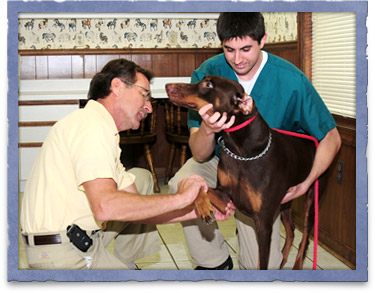 The Easton veterinarians and medical team at Community Animal Hospital in Easton believe regular physical examinations for your pet are the best way to ensure a lifetime of good health. When detected early, medical problems can usually be treated more effectively and at a lower cost. Examinations are critical to the care of all animals, from the very young to senior pets. Because young animals change rapidly, we examine them thoroughly at each of their puppy or kitten visits. We recommend annual physicals for mature pets and semi-annual physicals for senior pets. Don't forget—pets age faster than people do!
The Easton veterinarians and medical team at Community Animal Hospital in Easton believe regular physical examinations for your pet are the best way to ensure a lifetime of good health. When detected early, medical problems can usually be treated more effectively and at a lower cost. Examinations are critical to the care of all animals, from the very young to senior pets. Because young animals change rapidly, we examine them thoroughly at each of their puppy or kitten visits. We recommend annual physicals for mature pets and semi-annual physicals for senior pets. Don't forget—pets age faster than people do!
Our Easton pet wellness exams are scheduled for 30 minutes, allowing your pet's doctor to perform a thorough exam and to advise you on all aspects of your pet's care, including nutrition and behavior, and answer all your questions. Your veterinarian also tailors an immunization program according to the lifestyle, age, breed and risk factors of your pet. At this time, we also discuss any recommended procedures such as dental prophylaxis or diagnostic monitoring.
Your Pet's Health at Every Age and Stage
Your pet's wellness examination at Community Animal Hospital includes our commitment to:
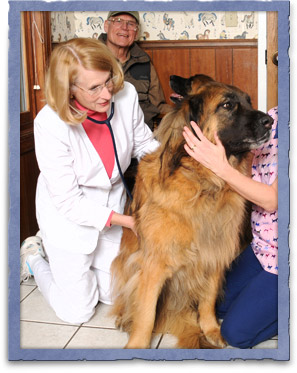
- Examine your pet's teeth, throat and oral cavity
- Check your pet's vision and examine the eyes
- Examine the ears for infection, ear mites, allergic reaction and other related health issues
- Examine the respiratory system
- Assess your pet's heart and evaluate cardiac function
- Test your pet's reflexes
- Palpate lymph nodes and abdomen
- Inspect your pet’s skin and coat
- Test to evaluate the function of internal organs and other systems
- Assess changes in your pet's body weight, appetite, urination and bowel habits
- Inquire as to your pet's activity level
- Palpate your pet’s skin for unusual growth developments
- Monitor your pet's blood count and chemistry
- Utilize laboratory testing to detect early signs of Heartworm disease, Lyme, and other tick-borne diseases
- Assess and evaluate general or specific changes in your pet's health since the last wellness visit
- Collect and examine fecal samples for signs of parasitic infestation
- Demonstrate how to administer at-home medication
During each examination, we listen to your concerns, answer your questions, and give you all the information you need to be the best caregiver to your pet. We also spend time discussing your pet's medical history, nutritional needs, behavior and exercise routine. Good communication between you and your pet's doctor ensures your beloved companion is receiving the optimal care and attention needed to live a long, healthy life.
Watch for subtle changes in your pet's body weight, appetite, water intake, urination and bowel habits, general attitude and activity level. Should your pet exhibit any changes or signs of potential illness, please don't wait. Call our office right away for an appointment.
Customized Vaccines for Dogs and Cats
Vaccinations are the number one way you can protect your beloved pet from serious infectious diseases. However, not every pet requires the same series or frequency of vaccines. We have always tailored our recommendations regarding all aspects of a patient's care, including vaccination, to suit the needs of each individual patient. This sets us apart from some large practices that have rigid and extensive vaccination programs for each species.
Recommended Feline Vaccinations
We observe the guidelines set forth by the American Association of Feline Practitioners. Dr. White attends the Cornell Feline Conference each year and keeps us informed of the latest research and recommendations.
We recommend administering the FVRCP (combined Feline Rhinotracheitis, Calicivirus and Panleukopenia) vaccine every three years to adult cats. Our annual Rabies vaccine is Merial's Purevax, which is non-adjuvanted and believed by many to be less reactive than the standard three-year vaccine. For our patients who go outdoors and are exposed to other cats, we recommend vaccinating against Feline Leukemia, and, in special circumstances, the Feline Immunodeficiency Virus (FIV).
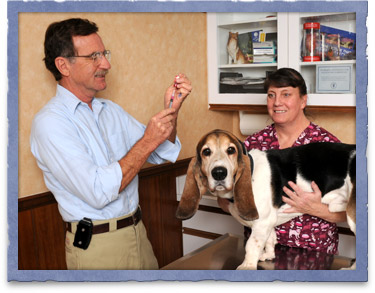 Recommended Canine Vaccinations
Recommended Canine Vaccinations
We recommend yearly immunization of dogs with a five-way vaccine providing protection against Distemper, Parvovirus, Hepatitis, Leptospirosis and Parainfluenza. This area has a great deal of wildlife, and therefore we feel it is important to provide protection against Leptospirosis; if a dog lives a sheltered life in town, we omit that component of the vaccine. We recognize that some owners prefer not to vaccinate their dog unless it is absolutely necessary, and we will gladly assess a pet's immunity against each of these diseases by sending a blood sample to the laboratory to determine titers.
Because of the large deer population in Easton and the prevalence of Lyme disease and Ehrlichiosis (in people as well as dogs), a large percentage of our patients receive Lyme disease vaccines on a yearly basis. We follow the state guidelines and vaccinate adult dogs every three years for Rabies (dogs under a year of age must be re-vaccinated in a year). We also recommend the Bordetella/Parainfluenza vaccine against "kennel cough" for our patients who go to kennels, dog shows, or other places where dogs congregate.
Caring for Your New Puppy or Kitten
Bringing a puppy or kitten home is a very exciting time for you and your family. Your veterinarian and medical team at Community Animal Hospital share your joy and are here to support you with individualized puppy and kitten wellness programs, vaccinations and home care guidance. After your initial visit, all subsequent puppy or kitten wellness visits are discounted. We also send all our puppy patients home with a courtesy dose of Heartworm and flea/tick preventive medications. All kittens receive their first dose of Revolution at no charge.
Your puppy or kitten's first year of care at Community Animal Hospital will include:
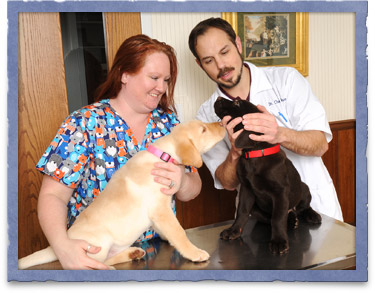
- Physical Examinations: Your puppy's or kitten’s lifetime of wellness starts with its first comprehensive nose-to-tail physical exam. Puppies and kittens should have 3-4 exams between the ages of 8-16 weeks. These longer visits are important because they provide your veterinarian with an opportunity to assess your pet's overall health and to administer vaccines.
- Vaccinations: Due to their developing immune systems, puppies and kittens must receive a series of properly staged vaccines. Because every puppy and kitten is unique, we tailor our vaccination recommendations based on their lifestyle and/or breed and according to the suggested medical guidelines.
- Diagnostic Testing: Puppies and kittens should be tested for intestinal parasites, and kittens tested for the Feline Leukemia and Feline Immunodeficiency viruses.
- Extended Discussion: Do you have questions about nutrition, training, vaccinations, spaying or neutering, grooming, or parasite protection? What about tips for introducing your new pet to other pets and family members? We take plenty of time during these visits to offer health care and training advice, and talk with you about any concerns you may have.
Puppy and kitten visits are an excellent way to get your new pet started on the road to a happy and healthy life. Take these important first steps with one of the warm and knowledgeable Easton veterinarians at Community Animal Hospital. Please call today to schedule an appointment for your new pet!
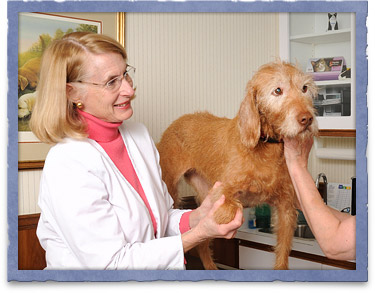 Senior Pet Care
Senior Pet Care
Does your pet take longer to fetch his or her favorite ball? Has he or she "forgotten" her house training? Is he losing weight or drinking more water? Is the condition of her coat and skin degenerating? You may think these behavioral and physical changes are all just normal signs of aging, but the truth of the matter is these and other such signs may indicate your best friend has a medical problem that needs attention.
It is estimated your pet ages five to seven years for every one of yours, which explains why health problems in your pet seem to progress at a rapid rate. As veterinarians, we see a number of conditions that can be treated effectively, especially if they are detected early. The most common senior problems are periodontal disease, osteoarthritis, heart disease, liver and kidney disease, thyroid disease, cancer, and cognitive dysfunction syndrome (which resembles senility in people).
Research shows that once a person lives to age 65, his or her likelihood of surviving to 80 and beyond is only 35 percent hereditary and 65 percent dependent on diet, lifestyle, and medical care. These "healthy living" variables are critical for older dogs and cats, too. As your pet gets older, we will be talking to you about changes in his food and perhaps recommending some labwork or other tests. Some of our geriatric patients benefit from more frequent physicals. We recommend doing "senior labwork" at least annually, and offer a very special rate on a panel of tests, including a complete blood count (CBC), chemistry profile, urinalysis, and thyroid tests. Dogs get a free heartworm check with this package, and cats get a free FeLeuk/FIV test.
Older pets make wonderful companions, and thanks to advances in veterinary medicine, pets are living longer than ever. By learning more about the special needs of your senior-aged pet, you're taking the first step toward providing the best care for your friend in his or her golden years. With our help, you can prolong your pet's good health and well-being, even as his or her pace slows a bit. Together, we can make sure you and your faithful companion enjoy many more years together.
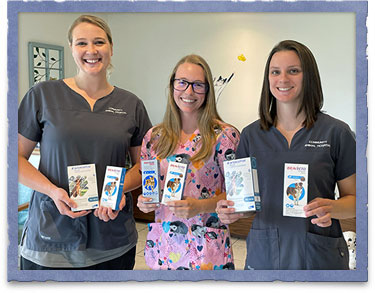 Flea and Tick Prevention
Flea and Tick Prevention
Fleas and ticks are more than a nuisance; they carry diseases dangerous to both you and your pet.
Prevalent tick-borne diseases on the Eastern Shore include Lyme Disease and Ehrlichiosis, which can be significant threats to you and your dog, especially during warmer months. Ticks and tick eggs live in the grass and weeds. Check and brush your dog after being outside, especially in grassy or brushy areas. If a tick is attached to your pet's skin, remove it carefully with tweezers and wash the affected bite area and your hands afterward.
Fleas are most abundant during the warm weather; however, if left untreated, they can be a problem year-round. In fact, flea infestation is one of the most common medical problems veterinarians see. Your pet can be allergic to fleas, and even just one bite can result in an itchy allergic reaction. Fleas can also transmit serious diseases such as bartonellosis (the bacteria that causes “cat scratch disease” in people) and parasites like tapeworms.
Prevention is the best course of action to protect your pet and yourself from fleas, ticks, and the potential of tick-borne disease. There are many safe, effective oral and topical flea and tick control products available at our hospital. Your veterinarian can help you choose the correct preventive regimen based on your pet's risk factors and health status. We also offer a Lyme disease vaccination, and we recommend discussing whether it is right for your pet.
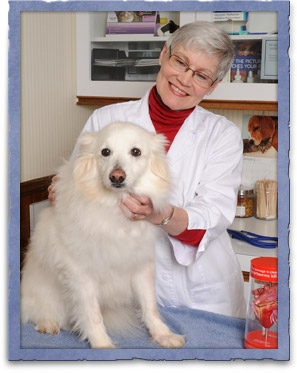 Heartworm Disease
Heartworm Disease
Heartworm disease is a serious, life-threatening disease transmitted by mosquitoes. It affects dogs and, to a lesser extent, cats. Today, Heartworm disease is found almost everywhere in the continental United States.
Clinical symptoms of Heartworm disease develop very slowly. Early symptoms include lack of energy, exercise intolerance, coughing and difficulty breathing. Because Heartworm disease is increasing in frequency and is a serious, deadly condition, we recommend your dog be tested annually.
Fortunately, Heartworm disease prevention is simple and effective. If you would like to find out more information on how best to protect your pet from this dangerous parasite or if you'd like to have your pet tested for Heartworm disease, please call Community Animal Hospital today for an appointment.